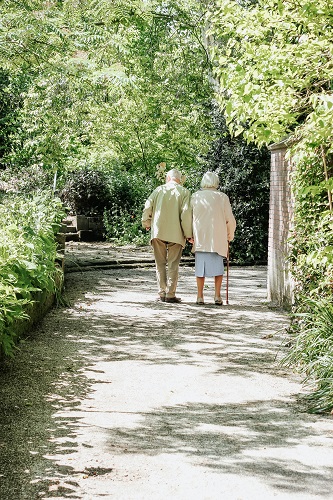No products in the cart.
Health Care Practitioners, Physical Wellness, Seniors
Aromatherapy for Dementia Patients & Caregivers
By Caryn Gehlmann, Clinical Aromatherapist
 Most of us know someone with dementia. Many of us are caregivers for parents with dementia or work professionally as a caregiver. We’re motivated by love, but it’s tough! I know this from personal experience as my parents, now both in their 90s, are struggling with dementia. I’ve recently done extensive research on using aromatherapy for dementia. I’ve also taken on a workshop hosted by the Tisserand Institute on how aromatherapy can alleviate some of the symptoms, and most importantly, comfort those with dementia. I wanted to share my findings with you.
Most of us know someone with dementia. Many of us are caregivers for parents with dementia or work professionally as a caregiver. We’re motivated by love, but it’s tough! I know this from personal experience as my parents, now both in their 90s, are struggling with dementia. I’ve recently done extensive research on using aromatherapy for dementia. I’ve also taken on a workshop hosted by the Tisserand Institute on how aromatherapy can alleviate some of the symptoms, and most importantly, comfort those with dementia. I wanted to share my findings with you.
Why is comfort so important when it comes to dementia? First, it’s important to remember that dementia is not a single disease. It’s a term used to describe a collection of symptoms that aging people experience when living with a variety of diseases, including Alzheimer’s. According to the Alzheimer’s Association, “Dementia symptoms trigger a decline in thinking skills, also known as cognitive abilities, severe enough to impair daily life and independent function. They also affect behavior, feelings and relationships.” With such distressing symptoms, it’s clear that both patients and their caregivers can benefit from receiving comfort.
In addition, recent studies show that anxiety is a common symptom for dementia patients, which exacerbates the symptoms of dementia itself. And it certainly adds stress to the caregiver! Anxiety may be heightened at night and can contribute to what’s referred to as sundowning. Thankfully, research shows that aromatherapy can reduce anxiety and offer comfort to dementia patients.
However, a well-researched, thoughtful approach to using aromatherapy for dementia patients is important. And to be clear, aromatherapy doesn’t “treat” dementia, it is simply a tool to cultivate comfort and support. Essential oils are not a substitute for medical treatment. It’s important to consult with healthcare professionals before using them for dementia patients.
 I’m currently working on newly formulated essential oil blends that will specifically address the needs of dementia patients and their caregivers. If you want to stay up-to-date on their release, sign up for e3’s newsletter.
I’m currently working on newly formulated essential oil blends that will specifically address the needs of dementia patients and their caregivers. If you want to stay up-to-date on their release, sign up for e3’s newsletter.
7 Essential Oils to Comfort and Support Individuals with Dementia
Let me share with you my research on aromatherapy for dementia and which essential oils are suggested for their potential calming or soothing properties. This is not a complete list, but some of the most widely used essential oils for dementia include:
Lavender: Why do many people consider lavender calming? Lavender can reduce anxiety by helping you slide on over to the parasympathetic nervous system. According to studies, lavender aromatherapy is thought to calm anxiety by impacting the limbic system, the part of the brain that controls emotions. The aromatic compound, Linalool, and its ester form, linalyl acetate 2, are lavender oil’s main constituents. Linalool affects the serotonin receptor. It helps treat conditions such as anxiety and depression and can help to combat insomnia.
Melissa: This precious oil, also called Lemon balm, has a light lemony scent that can gently relax people who are dealing with anxiety and insomnia, improve memory, and ease indigestion. (This precious oil is available as a more affordable dilute in our online store.) It is one of the most studied and researched oils on its effectiveness on dementia and Alzheimer’s.
Peppermint: Many feel more alert when they smell the fresh, uplifting aroma of Peppermint. But beyond the pleasant aroma, there are many physical, emotional, and mental health benefits of peppermint essential oil. Some of the most extensive research studies on peppermint oil have focused on IBS and other GI conditions, with positive results.
Rosemary: This is another uplifting and stimulating aroma that can reinvigorate the appetite and can be good in the morning. It’s used for nervous exhaustion, mild depression, mental fatigue, and mental fog. This is an essential oil to avoid if you have high blood pressure.
Bergamot: This citrus oil has a lovely, calming aroma used for mild depression, stress, anxiety, nervousness, mood swings, and apathy. Some find it helpful in relieving insomnia.
Frankincense: The earthy, grounding aroma of Frankincense is well-known to help with anxiety, stress, nervous tension, fear, and a restless mind.
Ylang Ylang: Rapid, tense breathing often accompanies anxiety. This essential oil relaxes breathing and general tension. It can also address mild depression, anger, shock, emotional coolness, and insomnia. Ylang Ylang is often combined with Lemon essential oil, another essential oil being studied to see if it can help a bit with cognitive function.
 You can also choose an essential oil that triggers a pleasant scent memory for your loved one. If your dad worked in his rose garden every day, you could see how he responds to the aroma of Rose. If your mom loved baking, maybe a blend of warm spices will help her feel relaxed. Individuals with dementia can have heightened sensitivities, so it’s good to start slow with new scents and observe how the person responds.
You can also choose an essential oil that triggers a pleasant scent memory for your loved one. If your dad worked in his rose garden every day, you could see how he responds to the aroma of Rose. If your mom loved baking, maybe a blend of warm spices will help her feel relaxed. Individuals with dementia can have heightened sensitivities, so it’s good to start slow with new scents and observe how the person responds.
Make sure you use high-quality essential oils that have been tested for purity. You can find application methods on each of our essential oils single and blend pages, as well as safety guidelines.
Recommendations for Aromatherapy in Assisted Living Facilities
Many dementia patients reside in assisted living facilities. Essential oils can contribute to a pleasant and calming environment for residents. I was pleased that the facility I recently helped my parents move into uses aromatherapy in their facility. However, it’s important to consider the individual preferences and sensitivities of the residents, and always consult with healthcare professionals before implementing aromatherapy.
Here are six ways to use essential oils at home or in assisted living facilities:
1. Diffusion: You can use diffusion in common areas to disperse a calming aroma throughout the facility. Do research on an essential oil that is universally loved and use a diffuser with adjustable settings so you can control the intensity of the fragrance.
2. Aromatherapy Sprays: Natural aromatherapy spritzers are diluted essential oils with water in spray bottles. Spritz common areas, hallways, rooms, or linen with refreshing and calming aromas.
3. Aromatherapy Inhalers: Personal inhalers or diffuser jewelry allows residents to choose a more individualized aroma. They can be on hand whenever they feel anxious or confused and could benefit from a calming breath.
4. Massage and Topical Application: An aromatherapy massage can be very relaxing for residents who enjoy physical touch. Essential oils can be added to lotion, such as a lavender-scented hand lotion. Whenever applying essential oils to the skin, make sure to dilute with a carrier oil.
5. Sensory Stations: I love this idea! Some resident facilities have sensory stations where residents can engage with different scents. A drop of essential oils can be placed on cotton balls, allowing residents to experiment with different aromas.
6. Aromatherapy Activities and Events: Many facilities host workshops and classes, an aromatherapy workshop will give residents the chance to learn about essential oils and maybe even create their own blends. Aromatherapy can also be integrated into wellness programs or relaxation sessions such as yoga or meditation sessions.
Always prioritize the well-being of residents and obtain consent before implementing any aromatherapy practices. Additionally, monitor residents for any adverse reactions and adjust the use of essential oils accordingly. If you have specific questions, our staff of trained Clinical Aromatherapists and healthcare professionals have experience working with healthcare facilities to develop aromatherapy programs.
Reminder for Caregivers
One research study noted, “The behavioral and psychological symptoms of dementia (BPSD) can be severely distressing for both patients and caregivers.” They studied the positive effects of aromatherapy for both the patient and the caregiver! With that in mind, many of the calming essential oils and application methods I share in this article are also helpful for caregivers struggling with stress, anxiety, restlessness, and a lack of sleep.
Here are two other articles to check out, Caregiver Stress? How Essential Oils Can Help and Caregiver Relief: 3 Quick ‘n Easy Ways to Recharge.
If you have specific questions about how to safely use essential oils to provide comfort and support, please contact e3’s team of clinical aromatherapists. And don’t forget to sign up for our newsletter to stay up-to-date on the release of new blends and to get a 20% off coupon.
Photo by micheile henderson on Unsplash








